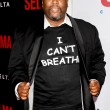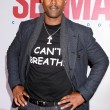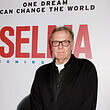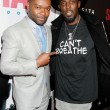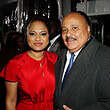“Selma” hits theaters on Dec. 25.
“Selma” celebrated its New York Premiere, presented by Paramount Pictures, Delta Air Lines, Tina Brown Live Media, and Credit Suisse, at the Ziegfeld Theater, where stars David Oyelowo, Oprah Winfrey (also a Producer on the film), Carmen Ejogo, Tom Wilkinson, Tim Roth, Common, Cuba Gooding, Jr., Andre Holland, Lorraine Toussaint, Niecy Nash, Stephen Root, Colman Domingo, Lakeith Lee Stanfield, Dylan Baker, Omar Dorsey, Stephan James, Wendell Pierce, Ruben Santiago-Hudson, Trai Byers, Henry G. Sanders, Jeremy Strong, Kent Falcon, and John Lavelle walked the red carpet alongside Director/Executive Producer Ava Duvernay, Producers Dede Gardner and Jeremy Kleiner, and Executive Producer Paul Garnes.
Oprah discussed producing and starring in the film.
As the producer, how important is it to put more women like Ava in the director chair?
Oprah: Well, it’s crucially important because this story would have been told completely different in the hands of a man. The original script was a different script than what Ava actually ended up creating because of the number of women in this script, the level of intimacy between Coretta Scott King and Martin Luther King that whole question that she lays on him in the middle of the film, the fact that there was a band of brothers, point of view is everything and I think having a woman’s point of view is absolutely necessary.
Oprah: Well first of all even if we didn’t know about a Ferguson, or an Eric Garner or Michael Brown, they were going on. The fact that they have now become newsworthy and made national and international news doesn’t mean that there have been nameless Michael Brown’s and Eric Garner’s before. So my feeling is that everything is always happening exactly as it should and on time. It’s no coincidence that this is happening now, but because it’s happening now – people are paying more attention. And I think life is always there ready to teach, enlighten and open you up to the greater possibilities of what can be done if you’re willing to be awake and to see it. So what’s exciting to me is that people are awake and that if it took Eric Garner and if it took Michael Brown and other incidents to do that then that’s where we are in our evolvement as human beings.
But I really think that this film can teach people a lot because what this film says is that it’s been done. It was done. Y’all are not the first to do it, first to have an idea, the first to want to protest, the first the be upset. We didn’t even have the right as citizens to vote in this country and because of that you had Martin Luther King as a leader joining with his band of brothers with disciplined, rigorous, peaceful protests and they had a goal and an intention in mind. You just can’t march and not know what you’re marching for. They had an intention and because they were clear about what they wanted and clear in their demands and clear in their rigor and discipline, they were able to accomplish the goal, time and time and again, so when it doesn’t work this time, “let’s go back to the table and create another strategy to get we want.” So the question is what do you what?
How important and how challenging was it for you being a mega-mogul to step into the shoes of Annie Lee Cooper.
Oprah: Oh that’s not challenging for me at all … because Annie Lee Cooper is my mother and my grandmother and my cousin, my aunt, she’s my aunt’s cousin. The reason I said yes to it aside from the fact that the real Annie Lee Cooper lived to be 100 and watched “The Oprah Show” every day at 4 o’clock with a tuna fish sandwich … and then I had to take it beyond just that, she represents to me – and this is what you all need to know as young people – that every day there were ordinary folks who had dreams and visions for their lives, who had courage beyond anything we can even imagine seeing rap talk about because what it takes to go to register to vote when you know you can lose your job and then you go and register to vote and then you’re denied and then you go back and then they say … well “you got to name how many gummy balls are in this jar … you can’t do that you’re denied.” And then then next time you come they say you got to know the constitution. You go back and that was the fifth time … year after year after year after year she went back and tried again because the right to be a full citizen in this country meant that much to her. And so I stand on that. I stand on it, I stand in it and I look at that and I go “that is who I am and that is where I come from,” so I did that role not just for her, but for every man and woman who ever walked to a register’s office and stamp denied, that’s why I did it.
http://youtu.be/jK-rSz0Kgjk
Common plays James Bevel in the film. He also wrote an original song “Glory,” with John Legend which was just nominated for a Golden Globe. Common shared the creative process behind the powerful song with us exclusively:
As an actor, I’m in “Selma.” So [the film] moved me as a human being to want to contribute more to bettering the world. And knowing the stories and everything that was going on, I spoke with Ava, the director about doing a song and then I just was like let me just start creating now, so I caught that moment and called John and said “Man, why don’t we do a song for this movie.” I told him about the movie and he said “Ok, I’m going to go to the studio on Wednesday and see what I come up with” … I gave him some titles and “Glory” was the third title I gave him, he sent me back the song with piano and him singing what he sings and I was like this is something special. He put the spirit of what the movement is in it and it felt like something divine and I was like I need to bring how the fight went on back then, that’s the same fight we’re fighting right now and we have to take the torch and go with that torch and move things forward. Right now it’s up to us and I felt like that that’s what we wanted to convey in the song and convey that it takes all of us and that’s how the song came about.
We also spoke with “Selma” executive producer Paul Garnes. He worked with Ava on “Middle of Nowhere” and produced “The Game” & “Being Mary Jane.”
How did you first connect with Ava?
I knew Ava for 15 years as a publicist. She was a publicist on multiple projects I worked on. I was a producer on the movie “Biker Boys,” Ava was the publicist, and 12 years ago she gave me the script for “Middle of Nowhere.” Jump forward 12 years she was gonna make it, so she called me and we started talking about it and it seemed like a good idea to go help her with it.
What attracted you to produce “Selma”?
We were all very attracted to it, because it was about Martin Luther King, and no one had ever made a movie about Martin Luther King. It was also intimidating because no one had ever made a movie about Martin Luther King. But it was something that Ava felt like on a story level she could wrap her hands around it. Working with Cloud 8 and Plan B and coming up with a budget, it just seemed like all the stars were lining up.
Speak about working Oprah.
Oprah’s amazing she’s like the zen master the glue that helped keep us all together.
Speak about watching David transform.
I’ve known David from the other film “Middle of Nowhere.” You know David’s a nice petite British guy, and you can’t imagine how he’s gonna fit into the suit of Martin Luther King. But David really came to set in a whole different space, on set he never talked in his British accent, he sounded like King like he was from Alabama or Georgia the whole time. It was amazing.
You have worked on TV and film. What do you love about each of the mediums?
It’s fun. TV is a different process, television is a little bit more repetitive, in film you have a little bit more creative freedom, whereas television you have to hit a model and stick to the model to make it work. But television is nice because it helps you understand the process so well, because you have to stay in the margins and time, with film you get a little more time to design it how you like it. So both of them have different qualities that I like, I like the challenges of TV and the freedom of film.
Speak about being on location in Alabama.
We had days when we had 500 or 600 extras, and a large portion of our extras were people who marched in the original march. So it was an almost religious experience to go through that with them, to walk the bridge and to have those moments where you are reminded that it’s not just a movie that it’s someone’s real life that what you’re representing happened and it happened to the people sitting in front of you. So it was definitely a great experience.
What advice do you have for aspiring producers?
It kind of folds into two parts. There’s a creative producer and physical producer sometimes it’s the same thing. But the creative producer is the one who helps the director, the writers and the actors deals with the creative side, the physical producer is the one who figures out the schedule, the budget how do you shot it, not what you shoot. The best thing to do is really just get started, there’s no magical moment when you become a producer really you become a producer when you start doing it, and that’s if you’re doing a big hundred million dollar movie or if you’re doing a $10,000 webisode on your Canon. Either way it’s the same thing that has to happen, so the best advice would be is to just start doing it, just get going and don’t wait.
What’s next for you?
I just finished the last season of “The Game,” “The Game” is done, it’s no more and I’m starting the next season of “Being Mary Jane.”
Also see what Stephan Jones, Trai Byers, Ruben Santiago-Hudson, Omar J. Dorsey, Henry G. Sanders & Jeremy Strong had to say about their roles in the film.
Tyler Perry and Aretha Franklin also attended the premiere.
Check out photos from the red carpet and after-party below:
“Selma,” from Paramount Pictures, Pathé, and Harpo Films, is in selected theaters on December 25, 2014, and nationwide on January 9th, 2015.

